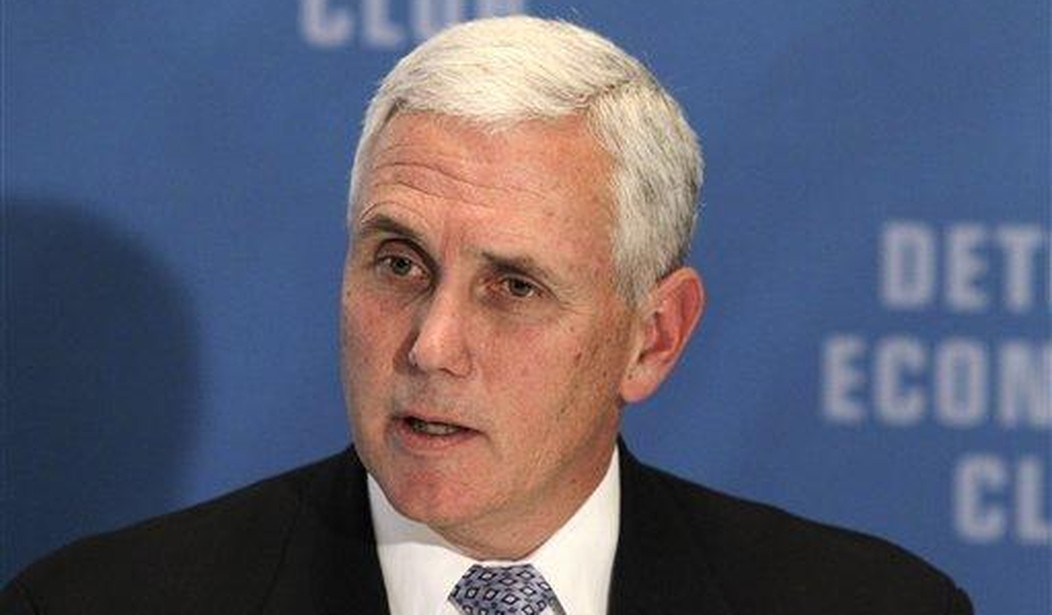Indiana’s new Governor Mike Pence has signed in to law a bill that will “pause’’ the state’s involvement in the nationwide Common Core education agenda. That fact that this is happening in Indiana has some very specific political significance, while the fact that it is happening at all has broad ramifications.
Before getting in to the meaning of Pence’s maneuver, consider some facts about Common Core. Officially named the “Common Core State Standards Initiative,” the agenda is not, itself, about curriculum mandates. It is a set of academic standards that students in the various grade levels are expected to achieve, in the states that have agreed to adopt the standards.
It is also the case that Common Core was created by the Obama Administration, but rather, it is actually an effort that first emerged at the state level, undertaken by state governors and state superintendents of education nationwide. The official sponsoring organizations of the initiative are the National Governor’s Association (“NGA”), and the Council of Chief State School Officers (“CCSO”).
Attempts to impose academic standards on public educators date back to the early 1980’s. In the 1990’s it became a state-driven matter, while The federal No Child Left Behind Act, signed in to law by President George W Bush in January of 2002, required the states to create their own academic standards, and then to achieve them, in order to receive federal education funds.
During the past decade, state Governors and state education Superintendents began to collaborate in an effort to bring uniformity to their respective states’ academic standards, and today, there are three primary organizations that advance the Common Core agenda. The NGA and the CCSO, as noted above, remain as the official sponsoring organizations of the initiative. Separately, a group called Common Core, Inc., a non-profit, 501 (c) 3 organization based in Washington, D.C., writes curriculum (not academic standards) that is intended to help educators comply with Common Core Standards.
Recommended
Supporters of the Common Core State Standards like to remind people that the initiative receives bipartisan support around the country. This is true - both the right-leaning “Excellence In Education Foundation.” a group headed by former Republican Governor Jeb Bush, and the left-wing American Federation of Teachers, support Common Core. Similarly, both Republican and Democrat Governors - including Governor Butch Otter (R-Idaho), Governor Jerry Brown (D-California), and Governor Duval Patrick (D-Massachusetts), all support the Common Core effort.
But Common Core also receives bipartisan opposition. The conservative-leaning Heritage Foundation, along with libertarian leaning groups like the Pioneer Institute of Boston, opposes the Common Core effort. But so also does Glenda Ritz, a Democrat who currently serves as Indiana’s State Superintendent of Education.
Ritz’ election in the heavily Republican state of Indiana is often cited as evidence of Common Core’s unpopularity. In November of 2012, Ritz unseated Indiana’s incumbent Republican State Superintendent, Dr. Tony Bennett, in part by campaigning against the Common Core initiative and claiming that Indiana’s adoption of the Common Core standards would result in a loss of state sovereignty. Ritz ended up receiving more votes in that election than did the new (and now very popular) Governor Mike Pence – and herein lies the significance f Pence’s latest move.
But Indiana’s “pause” on Common Core is not merely important for political reasons (it does, in fact, exemplify a sense of cooperation between Democrat Ritz and Republican Pence). It also demonstrates that at least some Americans still have a genuine concern about the federal government taking-over and controlling very intimate areas of our lives. It suggests that some of our fellow Americans still adhere to the wisdom of, say, Thomas Jefferson, who warned of the threat of tyranny from government, instead of buying-in to the naïve and selfish view that President Obama articulated last week in his commencement address to Ohio State University when he admonished graduates to resist those who warn of government tyranny (as if such a thing doesn’t really exist).
But is the Common Core standards agenda to be regarded as “tyranny?” Three separate federal laws prohibit the federal government from dictating educational curriculum content to the nation’s public schools. Yet on President Barack Obama’s watch, there has been a concerted effort within his administration to commandeer the Common Core agenda, and to skirt federal restraints.
Back in 2009 and 2010 when the administration was distributing so-called “stimulus” funds, one of the criteria for public schools to receive funds was for school districts to adopt higher “college and career standards” for students. And it just so happened that, in order to qualify for the stimulus funds, many states chose at that time to adopt the “Common Core” academic standards so they could apply for, and receive the federal funds.
The bipartisan group of Governors and state school Superintendents who support the Common Core agenda undoubtedly has the best of intentions. Yet the inability among elected officials to see how government power can be abused is a problem for both Republicans and Democrats.
The other states’ should follow Indiana’s lead. And after we hit “pause” on Common Core, let’s consider the same for Obamacare.

























Join the conversation as a VIP Member